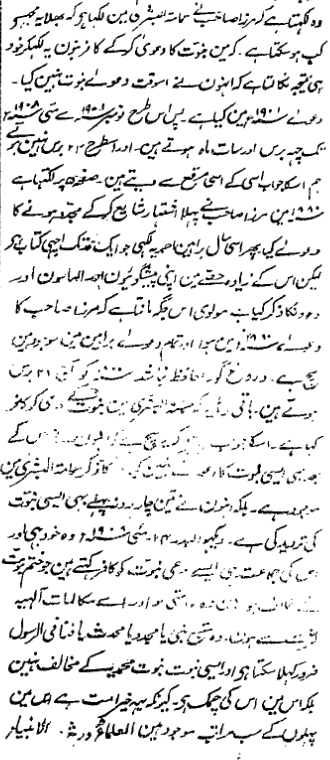Showing Islam is Peaceful • Tolerant • Rational • Inspiring
| Home
|
| 1.
Islam |
| 2.
Ahmadiyya Movement Refuting the Qadiani beliefs Theory of change in 1901 invented by Maulana Sana-ullah |
| 3.
Publications & Resources |
Theory of change in claim in 1901 — invented by Maulana Sana-ullah of Amritsarby Abid Aziz, Lahore While thinking about the Qadiani beliefs one thing that puzzles many people is from where the Qadianis took this idea that the Promised Messiah, Hazrat Mirza Ghulam Ahmad, changed his claim regarding prophethood in the year 1901. We cannot find even a single word in his writings where he has said that he changed his claim to that of prophethood at any time. It seems that the original inventor of this theory was Maulana Sana-ullah of Amritsar, one of the worst enemies of the Promised Messiah. The two key Qadiani beliefs in this respect are that:
Both these views were originally put forward by Maulana Sana-ullah of Amritsar. Background to why he invented this theoryThe Promised Messiah forwarded an irrefutable argument to prove the truth of his claim. This argument was that since he lived for more than 23 years after his claim, so he is proved as true in his claim. This argument is based on a Quranic verse. We do not want to get into the details of this argument for the purpose of this article. For Maulana Sana-ullah of Amritsar it was quite necessary to refute this argument and it was this purpose that prompted him towards inventing the above mentioned two beliefs. This is why he put forward the argument that the Promised Messiah did not lay a claim to prophethood before 1901 but that he made the claim to being a prophet in November 1901 by writing the pamphlet Ayk Ghalati Ka Izala. ProofThe proof of this is contained in an article which was published in Al-Hakam dated August 6, 1908, just two months after the sad death of the Promised Messiah. It is a long article written by one Hakim Dr. Ahmad Husain of Lyallpur. The whole article is devoted towards the refutation of different allegations that Maulana Sana-ullah made against the Promised Messiah. The issue mentioned above is also discussed there and the writer of the article has refuted this allegation too. Below the relevant part of the said article is translated. Notes in brackets, thus [ ], are provided by the translator.
This answer clearly shows that Hazrat Mirza Ghulam Ahmad did not later claim any kind of prophethood which he had been denying in the 1890s. Moreover, the term muhaddas is appropriate to describe his status, even at his death. Scanned image of Urdu original of above extract from Al-Hakam
|
Related links: 70 senior Ahmadis take oath that Hazrat Mirza did not change his claim in 1901 Ayk Ghalati Ka Izala — translation and notes |
